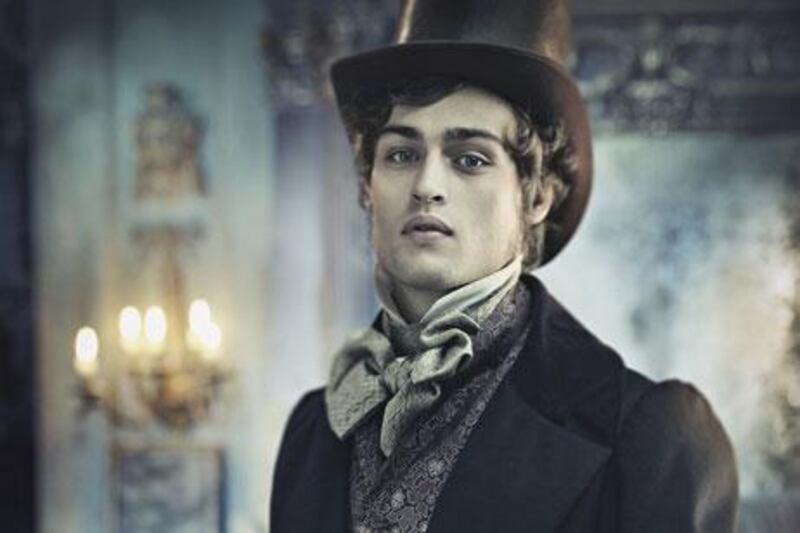As the brilliant BBC TV adaptation of Great Expectations drew to a close last week, seasoned Charles Dickens fans were probably waiting for the grimly bleak ending in which Pip finally finds his lifelong crush Estella again, only to find she has married a country doctor. Poor old Pip, thwarted in love again.
There was, in fact, no such scene. Instead, Pip found Estella alone, in the cobwebby grounds of the decaying mansion in which she'd grown up. The lovers slowly embraced as the emotional music swelled.
To be fair to the writer Sarah Phelps, Dickens himself revised the original ending after his aristocrat friend Edward Bulwer-Lytton complained in 1861 that it was too downbeat - although the suggestion in his second version is that Pip and Estella will be "just good friends".
But should the endings of much-loved books be messed with in this way?
Books: The National Reads
Book reviews, festivals and all things literary
[ Books ]
David Nicholls, the author of One Day, certainly has no qualms about doing so; his forthcoming film adaptation of Great Expectations, starring Helena Bonham Carter as Miss Havisham and Ralph Fiennes as Magwitch, has another denouement altogether. "Dickens came up with two endings - one which is incredibly bleak and one which is unrealistically romantic and sentimental," he said, late last year at a London film festival. "Neither is quite satisfactory and we've come up with an ending that isn't in the book - and is somewhere in between. It draws on events in the book but takes them in a slightly different direction, but is in no way sacrilegious."
Many Dickens followers will beg to differ. Certainly, there's nothing quite so controversial as changing the endings of bestsellers.
The director David Fincher was so aware of the trauma it can cause, his screenwriter Steven Zaillian softened any potential blows by talking about the tweaks they'd made to the closing scenes of Stieg Larsson's The Girl with the Dragon Tattoo a full year before the film hit cinema screens (although not in the UAE, where it has fallen foul of the censors). In the end, the changes weren't that dramatic - but the decision to meddle with the story at all has been cited as a reason for the film's slightly disappointing box-office performance. For cinemagoers, it seems faithful adaptations are preferable to the disorienting whims of innovative directors.
Which, actually, is a shame. Much scorn was heaped upon Zach Snyder's decision to change the ending of Alan Moore's twisted superhero comic Watchmen (and woe betide anyone who takes on a whole comic fan community), but the original plot was so outlandish that it would have been difficult to adapt coherently for the screen. Still, he had every right to try to make his ending fit within the context of the film he made.
And sometimes, such changes work. Arguably, Fight Club's filmic ending (another Fincher movie) makes more sense than the book - even the original author Chuck Palahniuk thought so and went on record to say he found his novel a little embarrassing by comparison.
And while we'll never know how JRR Tolkien would have felt about recent rumours that Peter Jackson will change the ending of The Hobbit for his forthcoming two-part film, it makes sense that the Oscar-winning director is considering it. After all, the hero of The Hobbit, Bilbo Baggins, is somewhat undramatically unconscious during most of the final battle in the book.
Similarly, the final scene of The Shawshank Redemption isn't in the Stephen King book at all - and in fact, originally it wasn't even in the film. Look away now if you're one of the 10 people in the world who hasn't seen the much-loved prison drama, but there's no suggestion of a big emotional reunion between Tim Robbins and Morgan Freeman's characters in the novel - just the possibility that it might happen. The director Frank Darabont wanted his movie to do the same but filmed the big, emotional "Hollywood ending" just in case - and it went down so well with test audiences it stayed in the final cut.
In the end, the movie is all the more memorable for it. Yes, it more obviously tugs at the heartstrings, but that's how films work. If directors slavishly followed the source text time after time, we'd be stuck with pointlessly repetitive films which took the best part of a day to watch.
Rarely does a new version of a Shakespeare play pretend we're all in 1590 - each individual director teases out new elements and relevances for our times. Similarly, new television and film adaptations of Dickens's novels, with their different endings and ideas, help keep alive the notion that his work isn't simply to be preserved in aspic, but can mean as much in 2012 as it did in 1861.
And the BBC has certainly taken that idea to heart. Next on its list in the Dickens bicentenary year is a completely new version of The Mystery of Edwin Drood. Although we'll let them do as they wish with that one. Poor old Dickens didn't finish it either - he died before he could solve the mystery himself.










